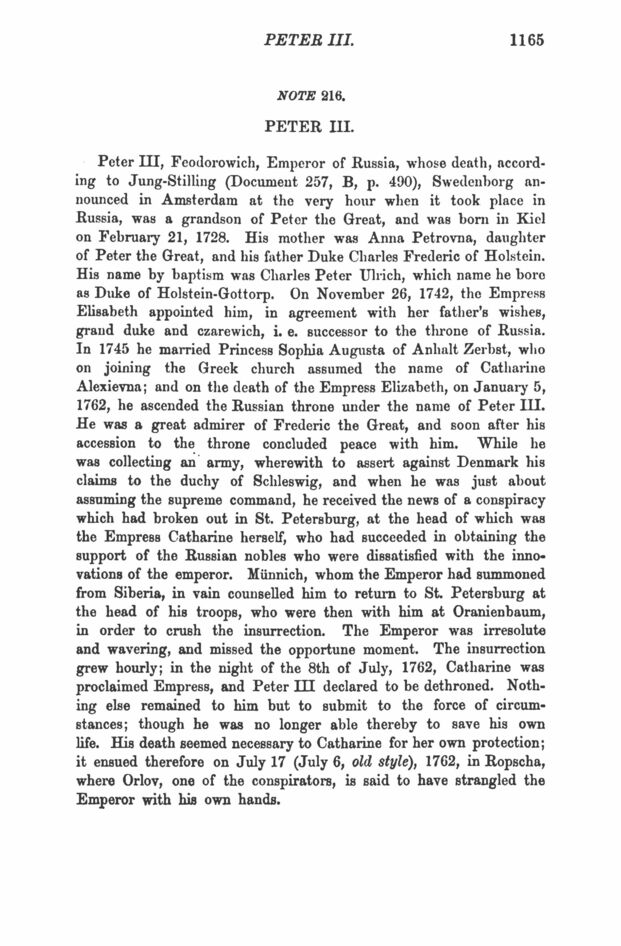
Full resolution (JPEG) - On this page / på denna sida - Sidor ...

<< prev. page << föreg. sida << >> nästa sida >> next page >>
Below is the raw OCR text
from the above scanned image.
Do you see an error? Proofread the page now!
Här nedan syns maskintolkade texten från faksimilbilden ovan.
Ser du något fel? Korrekturläs sidan nu!
This page has never been proofread. / Denna sida har aldrig korrekturlästs.
PETER III. 1165
NOTE 216.
PETER III.
Peter III, Feodorowich, Emperor of Russia, whose death, accord
ing to Jung-Stilling (Document 257, B, p. 490), Swedenborg an
nounced in Amsterdam at the very hour when it took place in
Russia, was a grandson of Peter the Great, and was born in Kiel
on February 21, 1728. His mother was Anna Petrovna, daughter
of Peter the Great, and his father Duke Charles Frederic of Holstein.
His name by baptism was Charles Peter Ulrich, which name he bore
as Duke of Holstein-Gottorp. On November 26, 1742, the Empress
Elisabeth appointed him, in agreement with her father’s wishes,
grand duke and czarewich, i. e. successor to the throne of Russia.
In 1745 he married Princess Sophia Augusta of Anhalt Zerbst, who
on joining the Greek church assumed the name of Catharine
Alexievna ; and on the death of the Empress Elizabeth, on January 5 ,
1762, he ascended the Russian throne under the name of Peter III.
He was a great admirer of Frederic the Great, and soon after his
accession to the throne concluded peace with him. While he
was collecting an army, wherewith to assert against Denmark his
claims to the duchy of Schleswig, and when he was just about
assuming the supreme command, he received the news of a conspiracy
which had broken out in St. Petersburg, at the head of which was
the Empress Catharine herself, who had succeeded in obtaining the
support of the Russian nobles who were dissatisfied with the inno
vations of the emperor. Münnich, whom the Emperor had summoned
from Siberia, in vain counselled him to return to St. Petersburg at
the head of his troops, who were then with him at Oranienbaum,
in order to crush the insurrection. The Emperor was irresolute
and wavering, and missed the opportune moment. The insurrection
grew hourly; in the night of the 8th of July, 1762, Catharine was
proclaimed Empress, and Peter III declared to be dethroned. Noth
ing else remained to him but to submit to the force of circum
stances; though he was no longer able thereby to save his own
life. His death seemed necessary to Catharine for her own protection ;
it ensued therefore on July 17 (July 6, old style), 1762, in Ropscha,
where Orlov, one of the conspirators, is said to have strangled the
Emperor with his own hands.
<< prev. page << föreg. sida << >> nästa sida >> next page >>